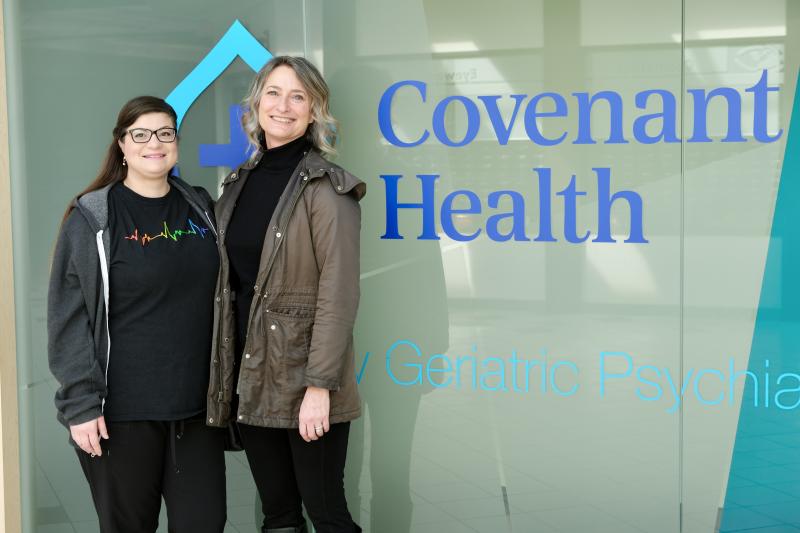By Alexander Delorme, Communications Staff
Sophia Altagracia Tavarez is a Licensed Practical Nurse who works for Covenant Health. As a member of AUPE Local 046, she works in the neonatal intensive care and emergency departments at the Misericordia hospital in Edmonton.
Altagracia Tavarez says she began her nursing career 12 years ago because she wanted to help people. This selflessness shines through when you ask her about her work, but the light is clouded by the severe conditions she and other hospital workers experience every day.
“The situations you walk into can be heavy, both mentally and physically, and we’re working 12 or 16 hours at once,” says Altagracia Tavarez. “It’s intense.”

Altagracia Tavarez says moving from neonatal intensive care to emergency was an eye-opener, and it is not hard to see why. Just last year, 26 rural emergency departments were forced to shut down. More than half of these emergency rooms closed for 20 days or more, reaching a combined 38,000 total hours closed. The reason? There were not enough staff available to meet Albertans’ needs.
Short staffing is a problem throughout Alberta’s health care system, creating a domino effect from department to department. For example, some patients are admitted to the emergency room even when they are not experiencing an emergency. Why? Because of bed blocks, which is another way of saying there is no room for them anywhere else. These inpatients usually stay in emergency until new space opens where staff can meet their care needs.
“They have to stay there until there is a bed for them upstairs,” says Altagracia Tavarez. “But it’s an emergency department. It’s not meant to be an inpatient area, which makes it quite difficult at times. There is a lot of just trying to do the best you can with the resources you have.”
“It’s not just the emergency department and it’s not just Covenant Health, it’s across the province. Who is going to take care of new patients when we are already at our limit?”
With health care workers as short-staffed and overburdened as it is, not to mention the crisis imposed by the pandemic in recent years, every strain on the system takes its toll. More resources would help AUPE members and all health care staff deliver the best care possible for Albertans, but workers like Altagracia Tavarez must struggle with what they have because of the government’s lack of investment.
“Ultimately, it comes down to funding and the resources we have,” she says. “It’s not just the emergency department and it’s not just Covenant Health, it’s across the province. Who is going to take care of new patients when we are already at our limit?”
Creating change through collective bargaining
AUPE members know that the best way to improve our working conditions is by fighting for them in collective bargaining.
“Members made it very clear: our priorities are wage increases, job security, and benefits,” says Anita Henderson, a Psychiatric Aide who also works for Covenant Health and was elected to the Nursing Care Negotiating Team. “It’s sometimes hard to voice your concerns, but your voice does matter. I hear you, your negotiating team hears you, and Albertans need to hear you. Let’s start making waves.”
Henderson is one of two members working in her position in Edmonton. She helps seniors with mental illness in the community, allowing them to live fulfilling, independent lives in their own homes. She works with many low-income seniors, including some who do not have much else for a support network, and knows a better collective agreement would help her help them.
“I got into health care because of my grandmother; caring for seniors is a passion for me,” says Henderson. “We all know that, with the government pushing back their funding, our seniors are suffering.”
The Covenant Health Nursing Care and General Support Services teams have already begun bargaining with their employer, and it is going about as well as negotiations elsewhere in the province. Covenant Health has offered members the same deal that Premier Smith has ordered AHS and other employers to offer: a four-year deal with only 2%, 2%, 1.75%, and 1.75% raises over those four years, as well as plenty of rollbacks.
“AUPE members are fed up with these offers, and rightfully so,” says AUPE Vice-President Darren Graham. “We are tired of being treated like we are disposable, like we are not essential to our health care system. We are! And we deserve working conditions that reflect that.”
"Both groups have proposed ambitious demands at the bargaining table, and we are going to have to put up a fight if we want the employer to take those demands seriously.”
Many members working for Covenant Health know an unfortunate truth about collective bargaining: Covenant Health usually waits for the Alberta Health Services agreements to work themselves out and then follows their lead. It can make it seem like bargaining is pointless if one collective agreement is just going to be decided by another.
But AUPE members do not have to accept this. We do not have to wait and see what happens. We can organize now to pressure Covenant Health into action. We can, and must, fight for better wages and working conditions.
“If you’re not happy with what the employer is proposing, you don’t have to say yes. You can say no,” says Henderson. “We need to let our employer know that our members stand together, shoulder to shoulder, ready to fight for what we want out of this collective agreement.”
AUPE Members are organizing bargaining town halls across the province this June. Covenant Health members will join thousands of other members at these town halls to unite under one purpose: to support our negotiating teams and prepare for whatever must be done to win. Vice-President Graham says this is something we must do not just for ourselves, but all Albertans.
“We have the chance to chart our own course,” says Graham. “Covenant Health nursing care and general support services members deserve better. Both groups have proposed ambitious demands at the bargaining table, and we are going to have to put up a fight if we want the employer to take those demands seriously. That’s how we improve our own lives. That’s how we fix health care.”


